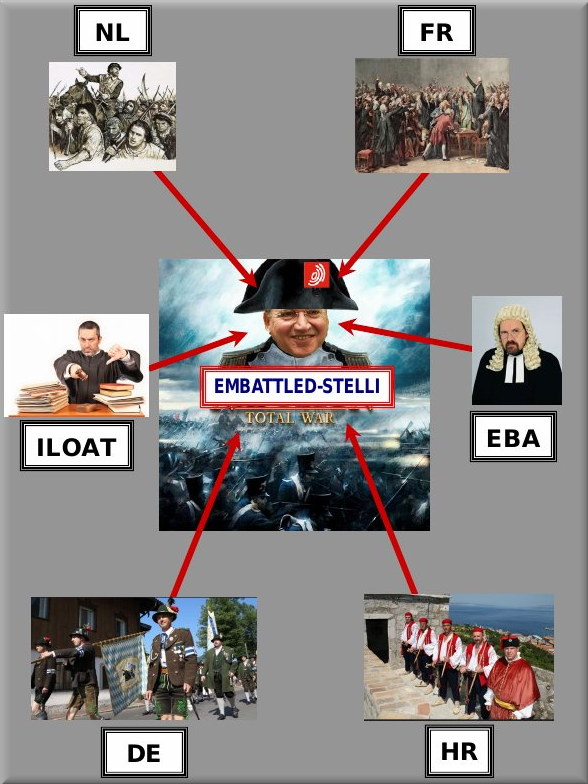12.13.16
Posted in Europe, Patents at 6:44 am by Dr. Roy Schestowitz

Summary: The patent quality of EPs — patents granted by the European Patent Office (EPO) — is declining and so will certainty surrounding EPs and value associated with them
OUR interest in the EPO goes back over a decade ago, back when software patents in Europe were debated and ruled out by Parliament (not that the EPO cared much about what Parliament had decided). With loopholes “as such”, the EPO granted a lot of software patents. EPO insiders even admit this to us.
Now that more and more EPs (European patents) are found to be invalid there is risk that applicants will no longer find the EPO all that attractive. Battistelli’s accelerated race to the bottom (of patent quality) yielded results like yesterday’s press release that speaks of EPs getting repeatedly revoked:
Akebia Therapeutics, Inc. (NASDAQ:AKBA), a biopharmaceutical company focused on delivering innovative therapies to patients with kidney disease through the biology of hypoxia inducible factor (HIF), today announced that the Opposition Division (OD) of the European Patent Office (EPO) has revoked another of FibroGen, Inc.’s HIF-related patents. The patent, EP 1 633 333 (the ’333 patent), claimed various compounds that were purported to stabilize HIFα for treating or preventing various conditions, including iron deficiency and specific forms of anemia. This ruling follows Akebia’s challenge to FibroGen’s earlier European patent, EP 1 463 823, which was revoked in its entirety by the OD earlier this year.
What is the EPO going to do about this obvious failure to guarantee patent quality? Tomorrow the Administrative Council is supposed to bring up this subject, as per intent expressed previously.
Belatedly (years late), and perhaps opportunistically after a lot of pressure (and ahead of the Administrative Council’s meeting), the EPO finally claims to obey some laws (for a change) by stating that it will no longer treat the EU Biopatent Directive (98/44/EC) like something to be spat at or ignored. There was a whole “news” item (actually hogwash) about it at epo.org yesterday and it said:
The European Patent Office has decided to stay all proceedings in examination and opposition cases in which the invention is a plant or animal obtained by an essentially biological process.
The decision was taken following the discussion by EPO member states in the Patent Law Committee of the Administrative Council on the recent Notice of the European Commission related to certain articles in the EU Biopatent Directive (98/44/EC).
When will the EPO obey the directive about software patents and stop granting patents on software? When will the Office admit that it messed up and granted many patents in error and/or against the rules? Who will take responsibility/accountability? █
Permalink
 Send this to a friend
Send this to a friend
12.12.16
Posted in Europe, Patents at 3:34 pm by Dr. Roy Schestowitz

Summary: The tough situation that Battistelli is in right now demonstrated using a picture (with omission of lesser prominent attack vectors)
A satirical graphic illustrating the current situation at the EPO is shown above.
Due to being under attack on so many different fronts the EPO‘s President has been given the nickname of “Embattled-stelli”.
The graphic refers to the following developments:
- NL: Criticism in the Dutch Parliament and request for a full parliamentary debate
- FR: Criticism in the French Parliament
- ILOAT: Recent Judgments from the ILOAT exposing flaws in the EPO’s internal legal system for dealing with staff grievances
- EBA: Decision from the Enlarged Board of Appeal protesting against interference by the President
- DE: Criticism from legal and political circles in Germany including prominent patent lawyers and members of the Bavarian Landtag, the German Bundestag and the European Parliament
- HR: Unresolved problems on the Croatian front █
Permalink
 Send this to a friend
Send this to a friend
Posted in America, GNU/Linux, Google, IBM, Microsoft, Patents at 2:48 am by Dr. Roy Schestowitz

Summary: An outline of one week’s news regarding software patents in the United States, with special emphasis placed on key foes and allies of GNU/Linux
The Lobby for Software Patents
THE USPTO can no longer grant software patents as routinely as it used to and some people are upset about it. These people, however, do not develop software.
“Sen Chris Coons,” according to this tweet, says that “Eroding patent protections for software and medical advances imperils American R&D, learning, health, and innovation,” but this coming from guy who never wrote a single line of code in his entire life does not mean much. Maybe he’s just funded by some large company that is pursuing software patents (like IBM and Microsoft). Moreover, with Watchtroll branding on the podium (see the photo), we assume that Chris Coons came there to serve patent maximalists, who have grown quite loud recently. Benjamin Henrion responded by saying that “software patents shifts R&D budgets to P&L.” (patents and litigation)
We are troubled to see the voices of the patent microcosm growing even louder in the wake of Trump’s election win. They want change and they want this change to harm software developers so that they can profit from (or tax) actual producers. IBM, we might add, is a growing part of the problem. Does IBM even realise to what degree it alienates the Free software development community by advocating software patents all the time? Does IBM truly realise that it aligns itself with patent extremists that insult judges and push for software patents based on self-serving lies? Does it care? Does IBM realise that by paying the former Director of the USPTO it participates in institutional corruption? And again, does it care? By lobbying to annul the Supreme Court’s decision and elevate less than a handful of Appeals Court (CAFC) decisions these people reveal their true face and selfish interests, which happen to harm every software developer around the world. It harms developers of both proprietary and Free/Open Source software.
CAFC on Software Patenting
Speaking of the Appeals Court, also published (albeit behind paywall) is this article titled “Appeals Court Casts Doubts on Smartflash’s Patent Win Over Apple” (we mentioned this before). “Two judges signaled the patents claim ineligible subject matter under Section 101 of the Patent Act,” says the summary. This article is mirrored here (also behind paywall). Section 101 certainly gets taken into account by CAFC, but patent law firms like Finnegan continue pushing the envelop on lies that software patents still have teeth in the US. It’s that usual cherry-picking of CAFC cases. Baker Botts LLP has just done the same thing. Don’t fall for it. In the vast majority of cases, including in 2016, CAFC rules against software patents and Section 101 remains very strong an argument against software patents. Watch this new docket report that says:
The court denied defendant’s motion for summary judgment of invalidity on the ground that plaintiffs’ call center telecommunications patents encompassed unpatentable subject matter because the motion obscured patents’ complexity with reductionist simplicity.
The recurring theme here was covered in almost a hundred Techrights articles. It definitely seems as though software patents aren’t coming back any time soon (if ever), but the patent microcosm sure is trying to accomplish that.
IBM and Conservative Think Tanks
Adam Mossoff, who works for a Conservative think tank and has a history of rather aggressive patent views (we covered these in [1, 2, 3]), is trying to shame Congress into pushing for reinstatement of software patents, based on misinformation. “Today,” he summarised it, “Congress should save software again by expressly confirming that it is a patentable technological invention.”
Nonsense.
If anything, software patents caused a lot of damage. But then again, judging by Mossoff’s paymaster, reliance on facts is almost a sin. Look where they stand on issues such as climate change.
“But this essential technology in our modern innovation economy is at risk,” Henrion quotes him as saying, responding with “yeah copyright replaced by patent trolls…”
Another person responded with “and look at the Patent Troll mess Software Patents has left us in…”
Exactly. Mossoff, as we pointed out here in the past, became a voice of patent trolls and the patent microcosm. He’s not a software developer and he merely ‘hijacks’ the voice of those who are with a nonsensical headline like “Congress Saved Software in 1980, and It Should Do It Again Today” (in a neo-Conservative Web site, of course).
This article seems to be one among several. The patent microcosm wants software patents back, unlike actual developers. Watchtroll is pressuring Congress on this subject also, most recently with yesterday’s headline (yes, a Sunday!) “Congress Can Save Software Patents by Repeating One of Its Successes”.
It’s just a bunch of mumbo-jumbo urging Congress to reinstate software patents and some of this mumbo-jumbo is promoted by IBM’s patent chief. Patent trolls proponents like Adam Mossoff are intentionally conflating software with software patents (one destroys the other) and then some IBM lawyers deems it cite-worthy? How stupid does IBM want to look here? It’s only going to harm the company’s relations with developers.
Google Against Software Patents, Unlike Microsoft
Contrast this with the following new article from Allen Lo, who is deputy general counsel for patents at Google. He published “Protecting Alice protects patent quality and technological innovation” and said in it:
The goal of the patent system, as set forth in the Constitution, is to promote the progress of the “useful arts,” which has always been understood to mean technological progress. Here at Google, we are proud of the many ground-breaking software inventions by our engineers that have allowed us to file a growing number of high-quality patents and establish a strong and valuable portfolio.
While Google and many other tech companies invest many billions of dollars in research and development (R&D) to make these inventions – and these patents – possible, not all software patents issued by the Patent and Trademark Office (PTO) are of high quality. A series of roundtables recently convened by the PTO in Alexandria, Va.; Stanford University; and other locations around the country explored one of the most important tools for improving the quality of software patents and ensuring that only worthy patents are approved.
That tool arises from the unanimous 2014 Supreme Court decision in Alice Corp. v. CLS Bank International, which established that software patent claims that recite a financial arrangement or broadly describe a function performed “on a computer” or “on the internet” are not eligible to be patented. Before Alice, applicants were obtaining patents from the PTO that were not based on any technical contribution or innovation, often not even providing an explanation of how they expected to achieve a result beyond stating that it would be done “on a computer.” Case law and PTO practices had swung too far toward allowing these low-quality claims to remain unchallenged, and a course correction was needed.
So we’ve covered IBM, Google, and what about Microsoft? Well, Microsoft is in the same boat as IBM when it comes to software patents and its patents have just survived CAFC’s scrutiny, based on this new report that says:
Microsoft has survived an appeal against a lower court decision that it didn’t infringe patents belonging to Impulse Technology.
Yesterday, December 8, the US Court of Appeals for the Federal Circuit affirmed the ruling of the US District Court for the District of Delaware, granting Microsoft’s motion for summary judgment.
In 2011, Impulse sued Microsoft, alleging infringement of 15 claims of the asserted patents: US patent numbers 6,308,565; 6,430,997; 6,765,726; 6,876,496; 7,359,121; and 7,791,808.
Inverting the Narrative
Truth be said, large companies don’t mind the patent mess because they can afford to pay the legal fees and this whole mess harms small companies the most. Here is a 15-page PDF of a paper by Professor Lemley et al in which it’s said (by Patently-O) that “patent litigation outcomes vary according to the identity of the patentee” or to quote Patently-O‘s summary: “The sales market for patent rights continues to vex analysts – especially in terms of valuation. In their Patently-O Patent Law Journal article, Professor Mark Lemley teams up with the Richardson Oliver Group to provide some amount of further guidance.”
It’s no secret that there is gross discrimination in patent systems, even in the EPO.
Part of the patent microcosm, or pushers for software patents (Bilski Blog), chose to distort the narrative of software patents (for large businesses, in bulk) and instead went with this narrative which would have us read about the “little guys”:
From the beginning my application was rejected, and continues to be rejected, under Section 101, even though we have recently overcome all of the prior art rejections. As a result, I have become something of an accidental student of patent eligibility and as such was very interested in attending the USPTO’s Patent Subject Matter Eligibility Roundtable I on November 14, 2016. Prior to the roundtable, I had assumed that my application was something of an outlier, that there was something wrong with it and that was why it had been rejected. At the roundtable I learned that “it’s not me, it’s you” applies not just to exes but to the patent system as well.
[...]
The few speakers at the roundtable who did advocate on behalf of us “little guys” often mentioned how the “direct costs” negatively impacted micro-entities, focusing on the need for examiners to avoid using “blanket statements,” to be specific in their responses, and carefully ensure the law is being properly interpreted and applied on a case by case basis. As a solo entrepreneur, I couldn’t agree more with the need to “get it right the first time,” as this would substantially reduce direct costs for us. My impression is that the examiner’s first instinct is often to reject without any substantive reason, hoping we’ll simply abandon the process altogether, or better yet, pay the ever increasing, exorbitant fees (for me) involved in requests for continued examinations and the appeals process.
This thing which the USPTO called “roundtable” was just an echo chamber. See our article about it and then see this article from Scott Graham of The Recorder (behind paywall). To quote the outline: “A discussion Monday at Stanford University was an opportunity for big tech companies, entrepreneurs, bar associations and academics to hash out the impact of ‘Alice’ and other developments in patent eligibilty.”
This was cited by IBM’s Manny Schecter (IBM is still dissatisfied because there is no software patents certainty and IBM attacks small companies using software patents). There was “no software developer around the table,” Henrion told IBM’s Manny Schecter, “how broken is that?”
Well, this whole “roundtable” was nonsense, or an exercise in fake transparency, giving the illusion of public participation in decision-making while excluding the main stakeholders (who actually produce something).
“If you write code,” I told Manny in relation to this tweet of his, “maybe you’ll understand it’s mumbo-jumbo buzzwords” (he wrote “Abstract? Technological? Concrete? Practical application? Exactly. From #patent perspective these simply cannot be defined precisely.”)
Henrion added, “Tangible?”
All those silly words are so often used by non-developers who try to convince us developers that software patents are desirable.
The Trolls’ Lobby
Witness how Watchtroll’s site wants to crush patent reform and harm actual producers of software etc. The title says “Advice for the Trump Administration and New Congress: Protect Bayh-Dole and Restore the Patent System” and it’s more like the above pattern of lobbying, which we are seeing more of these days.
Not too long ago Watchtroll called reformers “Patent infringer lobby”, leading people in the patent microcosm to saying stuff like: “Patent infringer lobby pushes Trump to aggressively pursue “patent reform” https://lnkd.in/fasm8pZ Time to call out deliberate infringers.”
Well, time to call out Watchtroll who didn’t write any code, doesn’t know how programs work, yet lobbies for software patents.
“Nice bullshit spin on the issue,” wrote a technical person (Raphaël Jacquot) about the above. Henrion wrote, “restore software patents and patent trolling.”
Good for the patent microcosm after all, and we know at whose expense…
Speaking of trolls, Blumberg who used to work for for the world’s largest patent troll, Microsoft’s patent troll that’s connected to Ray Niro (who is now dead), is quoted by IAM as saying: “In our view, Germany is the new Eastern District of Texas. That’s the venue that gives us the most concern.”
Blumberg is now working in Lenovo, which is believed to have colluded with Microsoft to block GNU/Linux (they denied this after actually admitting this).
Concerns about Germany becoming another/new Eastern District of Texas are real because of the UPC ambitions, which will thankfully never reach London. Alexander Esslinger (a.k.a. Patently German) wrote about the above quote: “Really ? At least of owners of SEP’s it is not so easy to get an injunction in Germany based on interpretation of ECJ Huawei-ZTE…”
“Is that a bad thing,” I asked him. He later responded to that, but one must remember whose side he is on. He’s not interested in a sane patent system but a system from which he profits more. Like Bastian Best, who spreads misinformation (biased by omission; fails to mention those ~80% of CAFC cases that send software patents down the sewer), he wants more patent litigation in Germany so that he can profit from that. IAM is on the same side as them and it’s eager for everyone to celebrate patent trolling that’s coming from the Far East. Here is the latest example of that: “Barely a week after KAIST sued several major tech companies in what appeared to be the first ever patent infringement action initiated by an Asian university in the United States, another Korean educational institution has launched its own assertion campaign in the Northern Districty of California.”
Remember that these are non-producing entities that are funded by public money.
Citing Microsoft and its massive patent troll (Intellectual Ventures), IAM also pretends that lowering patent quality is a good thing:
Perhaps the most striking thing was how quickly some of China’s major tech companies have become sophisticated IP players. Xiaomi’s progress in particular has been remarkable and with former IV IP executive Paul Lin on board, the company has one of the most experienced operators in the local monetisation market.
Xiaomi’s deal with Microsoft, announced in May this year, was in the spotlight on day 1 as Lin joined the software giant’s Micky Minhas to dissect one of the leading IP-driven transactions of 2016. As part of that agreement Microsoft sold the Chinese company 1,500 patents, giving Xiaomi a much-needed boost to its portfolio as it weighs up expansion into the US. For all that conditions are widely seen to have deteriorated for many patent owners in the US, the deal shows that American assets will always remain a crucial part of any company’s IP strategy be it focused on freedom to operate or monetisation.
Xiaomi’s patent settlement with Microsoft was an attack on Linux and on Free software, as we explained at the time. Given China’s approach towards software patents (the opposite of what the US is doing), we’re not too shocked to see this happening, but that does not mean we have given up, either. █
Permalink
 Send this to a friend
Send this to a friend
12.11.16
Posted in Patents at 2:13 pm by Dr. Roy Schestowitz
Does changing an organism genetically (by selective breeding or gene editing) give one ownership of anything new of its kind?

Summary: In an age of patented pigs (EPO) and plants/seeds it’s important to keep an eye on the CRISPR patent dispute
OUR previous post covered the Supreme Court’s (SCOTUS) upcoming decision on Life Technologies Corp. v Promega Corp. — a case that can certainly impact patent scope at the USPTO, much like Mayo did.
In related news, CRISPR will be challenged quite soon and the patent microcosm isn’t too happy about it. “Open Source Advocates Want CRISPR Technology to Be Free,” one patent maximalist wrote (paraphrasing the headline). Well, “Open Source Advocates” are not alone in this and the key question here is patent scope, not cost. As Benjamin Henrion put it, “does it take the form of a computer program?”
Well, patents on life are certainly a step too far. We need to ask ourselves who benefits here. See the new article titled “This Is How the CRISPR Trial Will Determine Our Future” (from Vice):
Arguments in a trial to determine ownership of CRISPR, a gene editing technology, started Tuesday in Virginia. The outcome will determine who gets ownership of an incredibly lucrative and incredibly powerful tool that has the potential to “treat” genetic disease.
Two groups are contending for the editing technology patent: on one side is MIT’s Broad Institute and Harvard University, and on the other is the University of California, Berkeley.
The first patent for this technology was filed in 2012 by University of California, Berkeley, researchers for their work describing how genes could be edited in-vitro, The Scientist reported. Later in 2012, researchers at Harvard and MIT filed a patent for editing genes in eukaryotic cells—like those in a forming baby. The UC Berkeley researchers claimed the second patent violated their patent, and this week’s trial will determine who gets intellectual rights to the technology.
The following article was sent to us by some readers over the weekend:
They lined up early Monday morning for ringside seats at the most sensational scientific showdown in the modern era.
The moment the doors opened, lawyers, reporters and hedge fund investors raced for a spot in the cramped, windowless U.S. Patent and Trademark Office in Alexandria, Va.
The tension in the room was electric, as the historic fight for the patent rights to the CRISPR gene editing technology got underway.
CRISPR (Clustered Regularly Interspaced Short Palindromic Repeats) is a revolutionary gene editing tool that allows scientists to edit DNA with unparalleled ease and precision. Two prominent public institutions — MIT and Harvard’s Broad Institute and University of California Berkeley — are locked in a legal cage match, fighting to privatize CRISPR.
It could be months before a victor emerges, but the winner will walk away with billions of dollars in licensing fees and total control over one of the world’s most important scientific discoveries.
The Atlantic too has explained the importance of this case:
Nobody could recall such a long line at the U.S. Patent and Trademark Office. On Tuesday, more than an hour before the scheduled hearing for a bitterly contested patent dispute over the gene-editing tool CRISPR, a line of lawyers, journalists, and biotech industry execs had snaked through the lobby and across the giant Christmas tree that bedecks government-agency headquarters at this time of the year.
Of course, the dispute over CRISPR is no ordinary patent battle. CRISPR is a potentially revolutionary technique that is so broadly useful across medicine, agriculture, and industry that it could earn the dispute’s winner billions of dollars. Lawyers for the University of California, Berkeley, and the Broad Institute of MIT and Harvard both argue that their scientists had invented CRISPR first.
The hearing was part of something called an interference proceeding—a piece of patent law that is quite literally archaic now. On March 16, 2013, the U.S. patent system switched the way patents are awarded: Previously, a patent was granted to the very first party to invent something; now, a patent simply goes to whoever files a patent application for an invention first. As it happened, Berkeley filed its initial patent just one day before the March 16 switchover. So here we are trying to figure out who invented CRISPR first.
“CSIRO [of CRISPR infamy received] a fair amount of undeserved bad press,” IAM wrote (defending CSIRO, obviously!), “some even going so far as to label it a ‘troll’” because it is (see our wiki page about it).
Will this madness finally end, at long last?
More patents do not imply more innovation. The Appeals Court, according to this new article from Mike Masnick, also reminds us that “Patent Infringement Is Good For Competition”.
“Of course,” Masnick writes, “if you’re playing along with the home game, you should already be scratching your head. After all, patents themselves are monopolies. So, if anything, you’d think that any antitrust argument would be focused on the patent holder rather than the patent infringer. But, here, RTI is arguing that the patent infringement itself is a form of an antitrust violation, as it’s part of BD’s effort to foreclose competition.”
Faulty logic. For over a decade we have said the same thing about patents, even back when Microsoft used them to expand its monopoly and assert authority or reign over Novell (and by extension GNU/Linux). If only more people cared to study the real (original) purpose of patents and their impact on competition, a lot of those puff pieces about “innovation” would be long gone. █
Permalink
 Send this to a friend
Send this to a friend
Posted in America, Patents at 1:36 pm by Dr. Roy Schestowitz
Better hurry up before Trump ruins the Supreme Court

Summary: Additional and belated remarks about Apple’s patent attacks on Samsung’s Android phones and the upcoming Supreme Court (SCOTUS) decision on Life Technologies Corp. v Promega Corp.
THINGS are about to change for the better at the USPTO because upcoming SCOTUS cases won’t challenge Alice (applicable to software patents) but instead jeopardise other kinds of patents.
Regarding the unanimous decision in favour of Android or Linux or Samsung (depends on how one looks at it), there have been endless streams of articles by now. We saw hundreds of articles in English (about 300 articles!) about it, not counting all the Apple fan blogs and articles in other languages. There’s also my personal take on it, as covered the other day (hours after the decision had been handed down). For those looking for some decent coverage, see Jurist, AOL, Ars, El Reg or even lesser known sites. Less objective (for either side) were IP Watch, MIP, TechDirt, and Bristows staff at IP Kat. Be careful of Apple advocacy sites disguised as news sites. Even SJVN decided to cover it, although it’s typically outside his scope. Florian Müller did a blog post about it and said: “Large parts of the (U.S. and global) tech industry will breathe a sigh of relief now.”
“We must understand that when it comes to patents the quantity (the more, the merrier) and quality (more is less or less is more) should be grounded on evidence-based analysis, not Battistellite ‘logic’ and Republican instincts.”“Yesterday’s Supreme Court ruling,” he later added, “means design patents won’t spell doom for alleged infringers anymore, but a lot depends on the Fed. Circuit” (CAFC). “The Supreme Court said what the Fed. Cir. got wrong; but now the same Fed. Cir still has to get it right,” he continued. “In 2017, we’ll see what happens.” As we noted here before, only the lawyers win in these disputes that last half a decade or longer.
IAM always complains when patent scope is restricted and this time was no exception; they’re hardly even closeted about their patent maximalist bias.
The net outcome here is a major loss for another kind of patent. We must understand that when it comes to patents the quantity (the more, the merrier) and quality (more is less or less is more) should be grounded on evidence-based analysis, not Battistellite ‘logic’ and Republican instincts. The EPO now moves in the opposite direction, broadening patent scope rather than tightening it.
SCOTUS is going to tackle another kind of patents quite soon (Life Technologies Corp. v Promega Corp.), as an article by Dennis Crouch, another from MIP, and more from patents-centric sites state with concern. Many articles have appeared in recent days and most of them are from the patent microcosm. We too mentioned this case before.
We continue to worry that Trump-appointed Justices (new appointees) to SCOTUS will ruin all/most of the patent progress made in recent years. Conservative think tanks, for example, are out in full force calling for the end of Alice as we know it. We’ll cover that separately later tonight. █
Permalink
 Send this to a friend
Send this to a friend
































 Content is available under CC-BY-SA
Content is available under CC-BY-SA